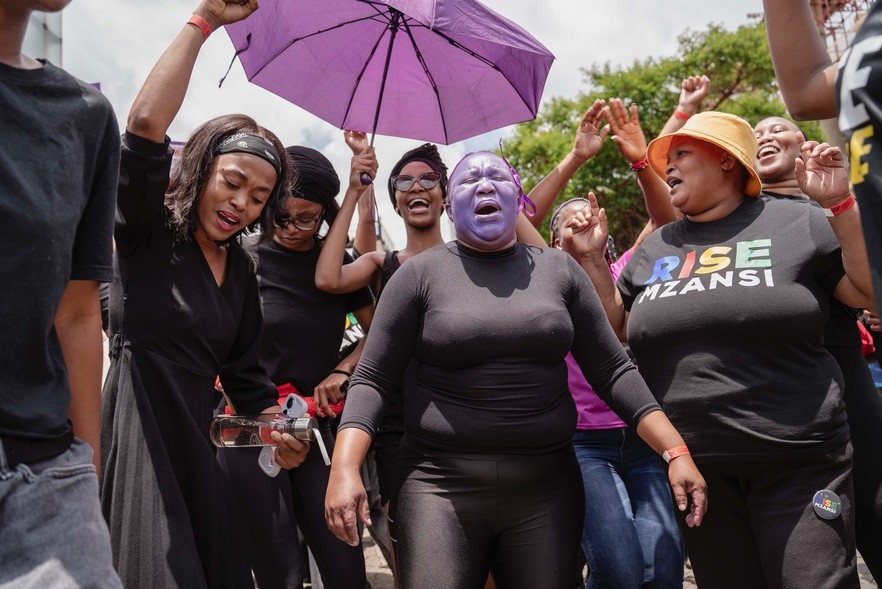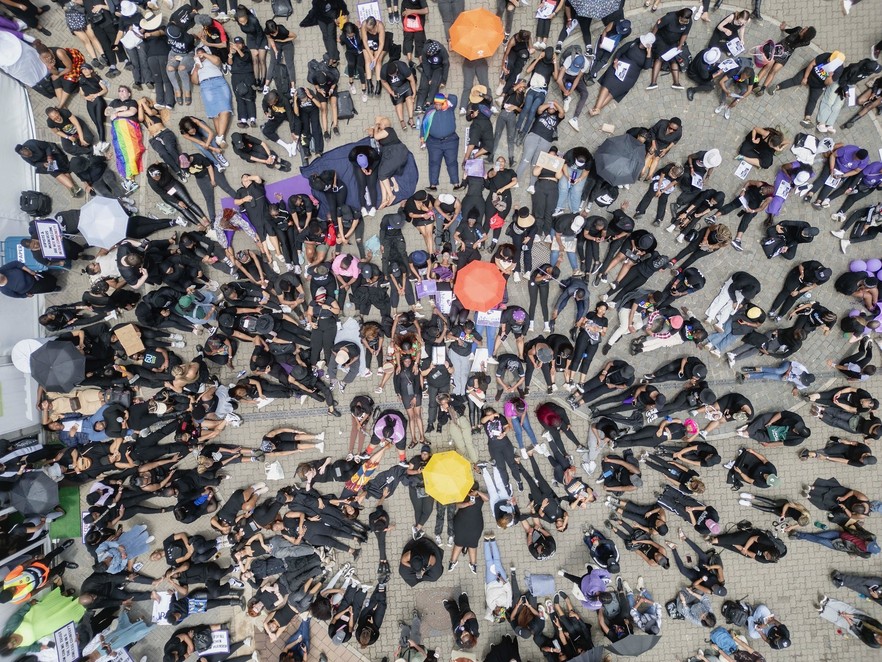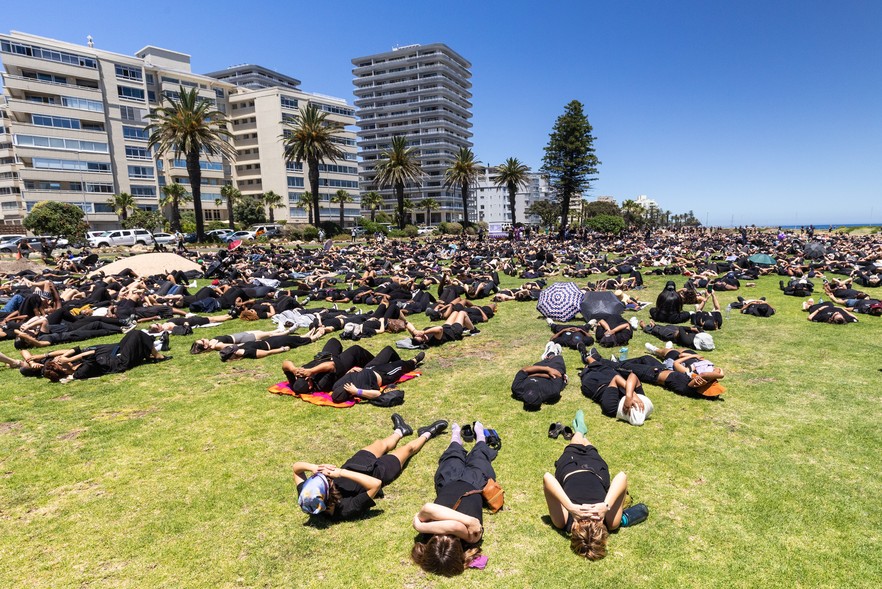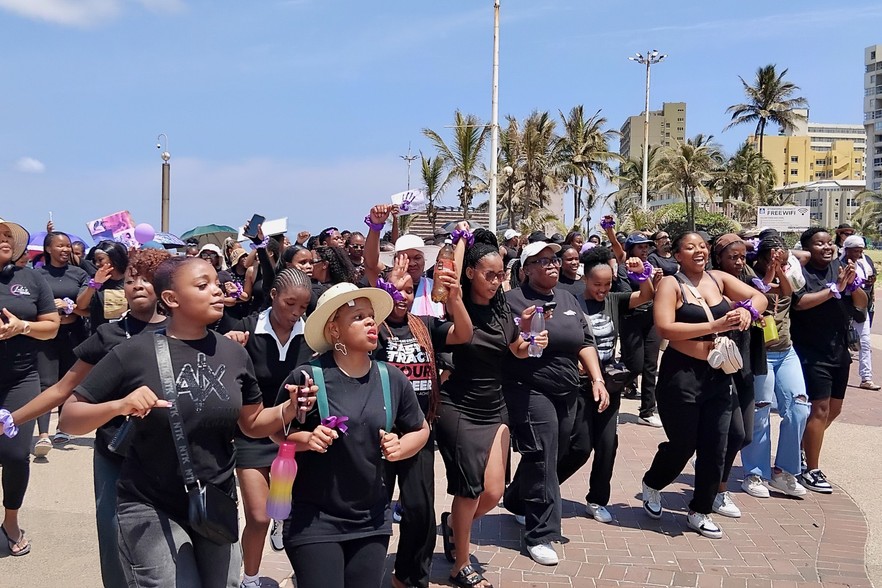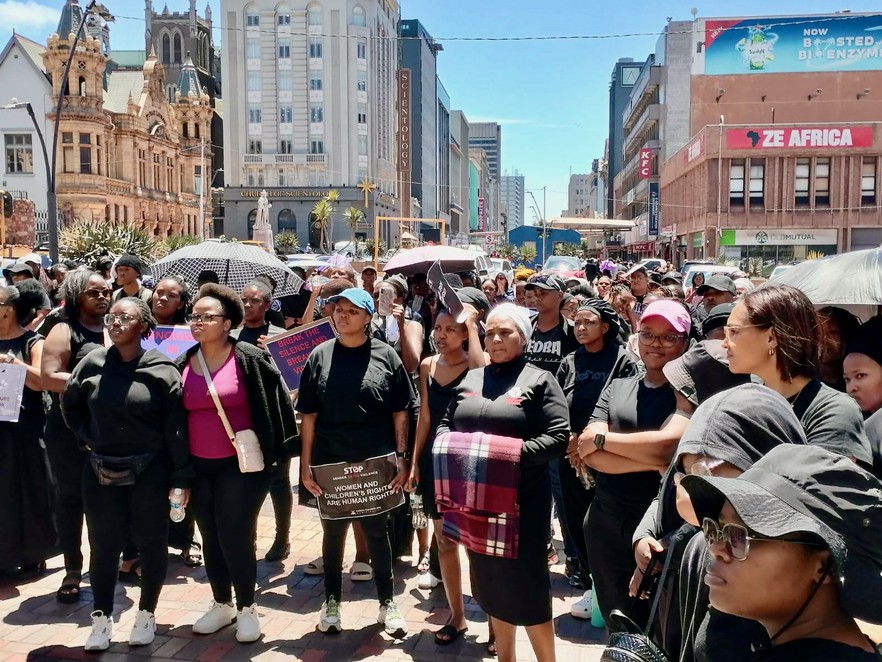In photos: Thousands protest to end violence against women
Government classifies GBV and femicide a national disaster, but it’s unclear what policies will follow from this
Demonstrators dressed in black gathered on the Sea Point promenade on Friday to show solidarity with those affected by gender-based violence. Over a thousand people participated in Cape Town. Photo: Ashraf Hendricks
Large demonstrations were held across the country on Friday against gender-based violence, in answer to a nationwide call by what has become known as the Purple Movement.
The protest was timed to coincide with the start of the G20 summit hosted by South Africa.
Head of the National Disaster Management Centre Bongani Elias Sithole has classified GBV and femicide a national disaster in terms of the Disaster Management Act.
Minister of Cooperative Governance and Traditional Affairs Velenkosini Hlabisa welcomed the decision. Hlabisa said that the “persistent and immediate life-safety risks posed by ongoing acts of violence” means that GBV and femicide now meets the “threshold of a potential disaster as defined in the Act”.
Hlabisa noted: “Importantly, this classification does not invoke emergency powers. Instead, it reinforces and strengthens the systems already in place, binding together key initiatives.”
Over a thousand people gathered at Constitutional Hill Precinct in Johannesburg to demonstrate against GBV. Photo: Ihsaan Haffejee
Women for Change, founded in 2016, called on “all women and members of the LGBT+ community across South Africa to refrain from all paid and unpaid work in workplaces, universities, and homes, and to spend no money for the entire day to demonstrate the economic and social impact of their absence”.
“Until South Africa stops burying a woman every 2.5 hours, the G20 cannot speak of growth and progress.”
The movement had also launched a petition to have GBV and femicide declared a national disaster, which has now been answered.
It says: “This crisis demands the immediate mobilisation of national resources and unwavering political commitment on an unprecedented scale to strengthen and transform the national response to the epidemic of violence against women and children.”
The petition sets out a range of actions it wants government to take, including judicial and legislative reforms, funding to implement national strategic plan on GBV and femicide (signed by President Cyril Ramaphosa in April 2020), the full implementation of the National Council on Gender-Based Violence and Femicide Bill, public access to a national sex offenders register, and mandatory education and ongoing awareness campaigns.
Protesters at the Constitutional Hill Precinct in Johannesburg. They wore black and read out the names of victims of GBV. The protesters participated in a “lie in” on the grounds. Photo: Ihsaan Haffejee
In Cape Town, people dressed in black gathered on the Sea Point promenade. At noon a silent lie-down was held for 15 minutes. Photo: Ashraf Hendricks
At Stellenbosch University a G20 Women’s Shutdown was held at Rooiplein. “[We] shut down our own campus so that perpetrators know that they cannot hide in this campus and that the victims are not alone,” said LLB student Malaika Ngwenya, coordinator of the shutdown. Photo: Ishmael Mabena
Hundreds of women, mostly dressed in black and purple gathered at south beach in Durban chanting “Wathinta bafazi wathinta imbokodo” (You strike the women you strike a rock). Photo: Tsoanelo Sefoloko
Hundreds of protestors gathered outside the East London City Hall and marched to Baby-Lee Recreational Park along the beachfront. Photo: Johnnie Isaacs
Nelson Mandela Bay Municipality staff and members of the public stood outside City Hall, Gqeberha. Photo: Thamsanqa Mbovane.
Support independent journalism
Donate using Payfast

Don't miss out on the latest news
We respect your privacy, and promise we won't spam you.
Next: Orange Farm’s crime fighting patrollers
Previous: Court orders Lesotho dams authority to pay 600 villagers compensation
Letters
Dear Editor
My poem addresses the ongoing crisis of gender-based violence in South Africa and speaks to the fear, silence, and resilience experienced by women and girls.
Poem Title: IT IS TIME
Tears cocoon fear
in the eyes of our girls
who were raised to conform
to the double standards set
by the same oppressors
who stalk the streets we walk
while chanting prayers
to reach home safely
It is time to undress
the targets from our bodies
we are not wounds
begging for attention
we are women
who desire the luxury
that safety has become
seeking justice for our sisters
who turned into statistics
The revolution we require
will not arise from complacency
it is time to raise our voices
and end the silence
it is time to stop
gender based violence
© 2025 GroundUp. This article is licensed under a Creative Commons Attribution-NoDerivatives 4.0 International License.
You may republish this article, so long as you credit the authors and GroundUp, and do not change the text. Please include a link back to the original article.
We put an invisible pixel in the article so that we can count traffic to republishers. All analytics tools are solely on our servers. We do not give our logs to any third party. Logs are deleted after two weeks. We do not use any IP address identifying information except to count regional traffic. We are solely interested in counting hits, not tracking users. If you republish, please do not delete the invisible pixel.


